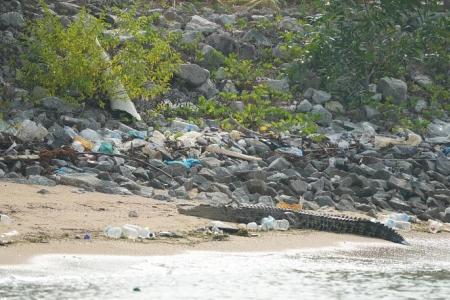Acres saddened over NPark’s decision to put down crocodile; others say the move was necessary
A large saltwater crocodile spotted near East Coast Park on Tuesday had been “sedated and humanely put down” to safeguard public safety, the National Parks Board (NParks) said on Thursday.
The move has generated a heated discussion, with animal welfare groups arguing against it and others defending it as necessary.
Animal Concerns Research and Education Society’s (Acres) co-chief executive Kalai Vanan Balakrishnan said NPark’s decision to euthanise the nearly 3m-long crocodile spotted in Marina East Drive was “saddening”.
“There are alternatives that can be looked into. Relocation is one of them,” he said, adding that NParks could also have considered tracking the crocodile’s movements with telemetry, and deploying staff to ensure public safety should the crocodile appear in populated areas.
“Such measures are not new in Singapore, and authorities have deployed these for other animals like otters and macaques,” he added.
Mr Shivaram Rasu, scientific officer at the Herpetological Society of Singapore, a reptile conservation group, agreed that relocation is a better alternative. He also suggested that crocodile exclusion enclosures can be installed in the sea to “prevent the dispersal of crocodiles into areas with human traffic”.
Mr How Choon Beng, director of wildlife management and outreach at NParks, explained earlier on Thursday that relocation was ruled out in this case, given the risk that the crocodile might return to where it was captured.
In 2021, a 1.53m-long crocodile spotted in East Coast Park was relocated to the Sungei Buloh Wetland Reserve. That crocodile was smaller and “assessed to be of a lesser risk to public safety”, said Mr How.
But the wetland reserve, which now has a large population of crocodiles, is no longer a suitable release site, he added.
Some netizens have asked if the endangered crocodile could have been rehomed in the zoo.
In response to queries from The Straits Times, a spokesman from the Mandai Wildlife Group said: “In zoo population management and planning, multiple factors are carefully considered.
“We must be satisfied that the outcome would favour the animal regarding the quality of life and welfare, as well as have no negative effects to our institutional population planning and conservation commitments.
“In this case, we determined we will not be able to rehome this individual in a way that meets these criteria,” the spokesman added.
Mr Ivan Kwan, founder of Nature Adventures SG, told ST that not all crocodiles can be relocated easily.
While the nature guide loves being able to spot a wild saltwater crocodile and educating people about it, he said one should not underestimate the risks of close encounters with large crocodiles, especially in areas with no barriers.
“The fact that this was a large adult crocodile residing a short distance away from East Coast Park, where people are regularly seen in and around the water’s edge, elevates the risk much more significantly,” said Mr Kwan.
“It’s unfortunate, but when it comes to large crocodiles that show up in areas so close to people, there are few other viable options to mitigate the risks to human safety, besides permanent removal from the wild, whether it means bringing that individual crocodile into captivity or euthanising it,” he said, adding that such practice is a standard procedure in many other places with a longer history of human-crocodile conflict.
Studies done on large adult crocodiles in Australia have also shown that relocation does not always work, said Mr Kwan. In many cases, satellite tracking of relocated crocodiles showed that a large proportion of them eventually returned to where they were captured, even after being transported hundreds of kilometres away.
He also agreed that Sungei Buloh Wetland Reserve is no longer a suitable release site, as it is already home to many adult saltwater crocodiles, which are highly territorial and would fiercely defend their home turf from intruders.
Saltwater crocodiles – the largest living reptile in the world – can be found all over South Asia, South-east Asia and parts of Australia, said Mr Shivaram from Herpetological Society of Singapore.
The one seen in Marina East Drive could have strayed from its home in Sungei Buloh or perhaps southern Johor or the Riau archipelago, he added.
Mr How from NParks advised members of the public to stay calm and back away should they encounter a crocodile. “They should not approach, provoke or feed the animal,” he said.
People should also heed warning signs and advisory notices that have been posted in areas where crocodiles have been sighted.
They can contact NParks on 1800-471-7300 or national water agency PUB on 9632-3261 to lodge a report if they come across a crocodile.
Get The New Paper on your phone with the free TNP app. Download from the Apple App Store or Google Play Store now


